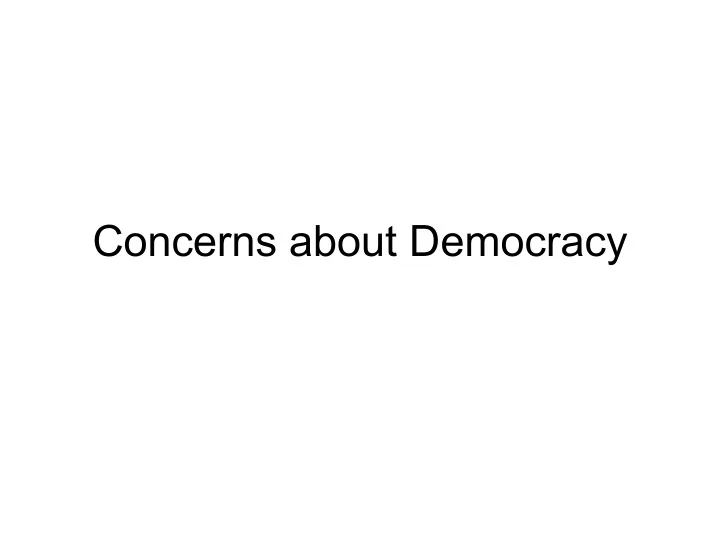

Concerns about Democracy
What is Democracy? What's the simplest definition of democracy?
What is Democracy? What's the simplest definition of democracy? Answer: Majority Rule.
What's good about democracy? What's bad about democracy?
Plato's Heirarchy of Governments Plato organizes government into a heirarchy: Aristocracy (rule by philosophers) "Timocracy" (rule by honor seekers) "Oligarchy" (rule by wealth seekers) Democracy (rule by majority) Tyranny (rule by corrupt) Plato says that Democracy is only one step better than tyranny. Why?
Plato against Democracy Plato dislikes democracy because: it allows ignorance rather than knowledge to control the city
Plato against Democracy Plato dislikes democracy because: it allows ignorance rather than knowledge to control the city makes freedom the supreme good
Plato against Democracy Plato dislikes democracy because: it allows ignorance rather than knowledge to control the city makes freedom the supreme good it creates strife because it doesn't not prioritize goals
Plato against Democracy Plato dislikes democracy because: it allows ignorance rather than knowledge to control the city makes freedom the supreme good it creates strife because it doesn't not prioritize goals it easily devolves into tyranny
Plato against Democracy Plato dislikes democracy because: it allows ignorance rather than knowledge to control the city makes freedom the supreme good it creates strife because it doesn't not prioritize goals it easily devolves into tyranny it has false ideas about what's good and bad, and so doesn't pursue what's good
Plato against Democracy
Lessons from Plato Can we abstract important ideas from Aristocracy?
Lessons from Plato Can we abstract important ideas from Aristocracy? Rule by non-idiots is important.
Lessons from Plato Can we abstract important ideas from Aristocracy? Rule by non-idiots is important. Even better than merely not being idiots is knowing how to rule.
Lessons from Plato Can we abstract important ideas from Aristocracy? Rule by non-idiots is important. Even better than merely not being idiots is knowing how to rule. And it's important that a ruler have the goal of doing what's good--really, truly good, not just what seems good to him.
Lessons from Plato Can we abstract important ideas from Aristocracy? Rule by non-idiots is important. Even better than merely not being idiots is knowing how to rule. And it's important that a ruler have the goal of doing what's good--really, truly good, not just what seems good to him. In a way, you might see Aristocracy as rule by the most qualified people who have the right goals. And we certainly do want qualified people to rule.
Is the United States a Democracy?
Is the United States a Democracy? You might think that the United States isn't a democracy in Plato's sense. The Constitution outlines clear limits of government.
Is the United States a Democracy? You might think that the United States isn't a democracy in Plato's sense. The Constitution outlines clear limits of government. There are branches of government with different roles rather than a single monolithic rulership.
Is the United States a Democracy? You might think that the United States isn't a democracy in Plato's sense. The Constitution outlines clear limits of government. There are branches of government with different roles rather than a single monolithic rulership. So it's not just whatever the masses want.
Is the United States a Democracy? You might think that the United States isn't a democracy in Plato's sense. The Constitution outlines clear limits of government. There are branches of government with different roles rather than a single monolithic rulership. So it's not just whatever the masses want. But... Is there any reason to think that democracy will aim at what's good rather than whatever people happen to think is important?
The Deep Platonic Critique Plato's deepest critique of democracy is that it doesn't have what's good as a goal. That's actually a critique of all forms of government besides aristocracy.
The Deep Platonic Critique Plato's deepest critique of democracy is that it doesn't have what's good as a goal. That's actually a critique of all forms of government besides aristocracy. That deep critique might certainly apply to the United States! While the U.S. might not look exactly like the monolithic majority rule Plato describes in Republic , nothing seems to require our divided, limited democracy to have good goals.
The Deep Platonic Critique But the Deep Platonic Critique is controversial. Is it really the role of a government to advance what's good? That is pretty controversial. What other role might government have?
Recommend
More recommend